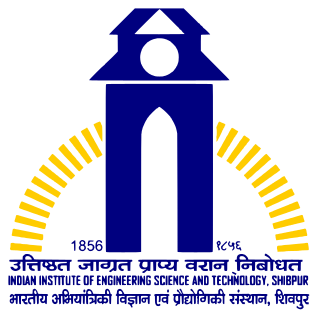Related Research Articles
In legislative procedure, a rider is an additional provision added to a bill or other measure under the consideration by a legislature, which may or may not have much, if any, connection with the subject matter of the bill.
The National Institutes of Technology (NITs) are centrally funded technical institutes under the ownership of the Ministry of Education, Government of India. They are governed by the National Institutes of Technology, Science Education, and Research Act, 2007, which declared them institutions of national importance and laid down their powers, duties, and framework for governance. The act lists 31 NITs. Each NIT is autonomous and linked to the others through a common council known as the Council of NITSER, which oversees their administration. All NITs are funded by the Government of India.

Indian Institute of Engineering Science and Technology, Shibpur is a public technological university located at Shibpur, Howrah, West Bengal, India. Founded in 1856, it is recognised as an Institute of National Importance under Ministry of Education by the Government of India. It is controlled by the Council of NITSER. It is the fourth oldest engineering institute in India

The government of Alabama is organized under the provisions of the 2022 Constitution of Alabama. Like other states within the United States, Alabama's government is divided into executive, judicial, and legislative branches. Also like any other state, these three branches serve a specific purpose in terms of power.
This is a brief description of the lawmaking procedure in India.

Maulana Azad National Institute of Technology Bhopal is a public technical university located in Bhopal, Madhya Pradesh, India. It is part of a group of publicly funded institutions in India known as National Institutes of Technology. It is named after the Independent India's first Minister of Education (India), scholar and independence activist Abul Kalam Azad who is commonly remembered as Maulana Azad.
During the second five-year plan (1956–60) in India, a number of industrial projects were contemplated. To ensure enough supply of trained personnel to meet the demand for these projects, a decision was taken to start the Regional Engineering Colleges (RECs), at the rate of one per each major state, which can churn out graduates with good engineering merit. Thus, seventeen RECs were established from 1959 onwards in each of the major states. Each college was a joint and cooperative enterprise of the central government and the concerned state government. Today, all these institutes now offer degree courses at various bachelors, masters and doctorate levels in various branches of engineering and technology. The entire non-recurring expenditure and expenditure for post-graduate courses during the REC times were borne by the central government. As regards in the REC system the entire recurring expenditure on undergraduate courses, the same was shared by the central government and the state government on 50:50 basis. However, after becoming National Institutes of Technology (NITs) the entire funding is managed by the center now. REC system served well but as time passed some state governments showed lack of responsibility to take them in right direction. Following the long-standing demand for more Indian Institutes of Technology (IITs) the then Minister of Human Resource Development Murli Manohar Joshi decided to upgrade the RECs to NITs. In 2003, all RECs were upgraded to NITs and central government took control to run these Institutes.
Indian Institutes of Engineering Science and Technology was a planned group of academic institutions in India for research and education in engineering, originally proposed by the Government of India in 2007 to meet the increasing demand for technological and scientific workforce in the industrial and service sectors of India as well as the growing need for qualified personnel in research and development.
In India, Institute of National Importance (INI) is a status that may be conferred on a premier public higher education institution by an act of the Parliament of India for such institutions which, "serve as a pivotal player in developing highly skilled personnel within the specified region of the country or state." Institutes of National Importance receive special recognition, higher autonomy, and direct funding from the Government of India. Some of India's highest ranked universities, including all of the IITs, NITs, AIIMSs,IISERs and IIMs, have this status.

The National Institutes of Technology, Science Education and Research Act, 2007 was enacted by the Parliament of India to declare India's National Institutes of Technology (NITs), Indian Institute of Engineering Science and Technology (IIEST) and Indian Institutes of Science Education and Research (IISERs) as Institutes of National Importance. The former Act received the assent of the President of India on 5 June 2007 and became effective on Independence Day, 2007. The National Institutes of Technology, Science Education and Research Act, 2007 is the second law for technical education institutions after the Indian Institutes of Technology Act of 1961.

Indian Institute of Science Education and Research, Vithura,Thiruvananthapuram is an autonomous public university located in Vithura, Kerala, India. The institute is one of the seven IISERs established by the Ministry of Human Resource Development, Government of India, to bridge the gap between research and basic sciences' education at the undergraduate level. All IISERs are declared as Institutes of National Importance by the Parliament of India in 2012 through the NIT Amendment Act.

Indian Institute of Science Education and Research Kolkata is an public autonomous Research institute in science and education field located in Mohanpur near the town of Kalyani in Nadia, West Bengal, India. It was established by the Ministry of Education, Government of India in 11 July 2006 and promoted to the status of an Institute of National Importance in 2012 vide the NIT Amendment Act. It is one of seven Indian Institutes of Science Education and Research, and was one of the first IISERs to be established along with IISER Pune. It is considered to be one of the leading institutes of India in terms of research output. In 2022, it was ranked fourth among the academic institutions in India by the Nature Index in 2022. The current director of IISER Kolkata is Prof Sunil Kumar Khare.

The Ministry of Education (MoE) is a ministry of the Government of India, responsible for the implementation of the National Policy on Education. The ministry is further divided into two departments: the Department of School Education and Literacy, which deals with primary, secondary and higher secondary education, adult education and literacy, and the Department of Higher Education, which deals with university level education, technical education, scholarships, etc.
Student Senate for California Community Colleges (SSCCC) is a California nonprofit public benefit corporation. SSCCC came into existence on April 29, 2015 when a document titled "Articles of Incorporation of Student Senate for California Community Colleges" was filed in the office of the California Secretary of State. Prior to that filing, the Articles were signed by a community college student named Omar Paz Jr. Omar is the founder and "Incorporator" of SSCCC. In his capacity as Incorporator, Omar elected the initial directors of SSCCC.

India has the largest numbers of engineers as well as the largest number of engineering education institutes and infrastructure in the world. As of 2021, India annually produces 1.5 million engineering graduates. India's technical education infrastructure includes 2500 engineering colleges, 1400 polytechnics and 200 schools of planning and architecture.

National Institute of Technology Puducherry is an autonomous public technical and research university located in the city of Karaikal in Union Territory of Puducherry and is a coastal enclave in the basin of river Kaveri within the Nagapattinam District of Tamil Nadu. Founded and Established in 2010, it is one among the 31 National institutes of Technology of India and is declared as an Institute of National Importance by the Government of India under National Institutes of Technology, Science Education and Research Act, 2007.

Clifford Ordia is a Nigerian engineer and politician who hails from Usugbenu Irrua in Esan Central local government area of Edo State. A Senator of the Federal Republic Of Nigeria from 2015-2023,who represented the people of Edo Central senatorial District, Edo State. in the Nigerian Senate and he is a member of the People's Democratic Party, PDP.
Howrah is a city in West Bengal, India. The education system of Howrah are followed below.

The National Institute of Technology Tiruchirappalli is a national research deemed university near the city of Tiruchirappalli in Tamil Nadu, India. It was founded as Regional Engineering College Tiruchirappalli in 1964 by the governments of India and Tamil Nadu under the affiliation of the University of Madras. The college was granted deemed university status in 2003 with the approval of the University Grants Commission (UGC), the All India Council for Technical Education (AICTE), and the Government of India and renamed the National Institute of Technology Tiruchirappalli.
References
- ↑ "About the Council | Council of NITSER". nitcouncil.org.in. Archived from the original on 2014-01-12. Retrieved 2021-05-26.
- ↑ "Governance Structure | Council of NITSER". nitcouncil.org.in. Archived from the original on 2014-01-14. Retrieved 2021-07-19.
- ↑ "Functions of the Council | Council of NITSER". nitcouncil.org.in. Archived from the original on 2014-01-12. Retrieved 2021-07-19.